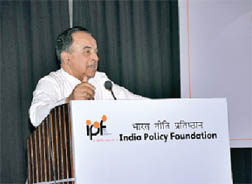 Pandit Deendayal Upadhyay’s?? Integral Humanism — A Response to Neo-Liberalism
Pandit Deendayal Upadhyay’s?? Integral Humanism — A Response to Neo-Liberalism
Intro: Upadhyay’s holistic vision of integral humanism contained India’s ancient wisdom that has answers to many contemporary issues.
Pandit Deendayal Upadhyay’s contribution to political thought stressed on the need to create an alternative socio-political ecosystem, as all Western ideologies, which are one or another dimension of materialism, have failed in addressing the growing crisis of humanity, said Veteran BJP leader Dr Subramanian Swamy in a seminar organised by India Policy Foundation (IPF) on September 25 on Integral Humanism—a Response to neo-Liberalism at the India International Centre (IIC) on September 25, 2014.
The seminar was held to commemorate 98th birth anniversary of Pandit Deendayal, one of the renowned thinker, ideologue and a late member of the erstwhile Bharatiya Jan Sangh, and in attendance were 500 people from different walks of life. The republished edition of the late Pandit Deen Dayal Upadhyay’s novel Samrat Chandrgupt was also released. Professor Rakesh Sinha, Honorary Director, IPF, said that ideologies like individualism, liberalism, capitalism and communism, all of which emanated from the West, still held sway over the colonised Indian minds, resulting in the vast majority of people being excluded from any meaningful discourse. Neo-liberalism, born out of liberalism and capitalism was like a “baby born with pregnancy”, said Sinha, explaining further that Upadhyay’s holistic vision of integral humanism contained India’s ancient wisdom that has answers to many contemporary issues.
Dr Gautam Sen, a distinguished scholar, explained integral humanism as belonging to the tradition of Adi Shankaracharya and Swami Vivekananda. He said that Upadhyay recognised the power of India’s ancient wisdom, and his vision of integrated humanism was a powerful rationale for return to Indic values.
Well-known TV journalist Punya Prasoon Bajpai said that the successive governments have failed to create any ecosystem that can address even the basic needs of common citizens. On the other hand, the domination of the political class had been broken after the 1991 liberalisation, only to be replaced by their becoming slaves to the power of corporations, which are globally networked and recognise only the power of money and are driven by profits and consumerism. Ramesh Patange, former editor of Marathi weekly Vivek, stressed that nationalism ought to be synonymous with social justice and social harmony, something which Upadhyay alluded to in his ideology. Eminent thinker and educationist Pushpesh Pant cautioned against making the subject of integral humanism a mandatory part of any academic syllabus, as that would ensure its demise. He said Indian society ought to free itself of colonial mindsets if it has to attain success in making integral humanism a reality.
Prafulla Ketkar, editor of Organiser, said that there has never been any relevance of the concept of Left and Right in our society. Western and European thought rests on certain divisive premises and have divided India badly. India’s thought is integrationist is well articulated by Upadhyay’s integral humanism.
Economic thinker and IPF trustee Gopal Agrawal said that Western ideologies like capitalism and free markets, which the West has tried to impose upon the world, have led them badly wanting in the face of the global economic crisis that hit the world markets and the economies of nearly
every country.
In the valedictory session, Professor Kapil Kapoor, former Pro-Vice Chancellor of the Jawaharlal Nehru University (JNU), said that liberalism began as a British tool to escape the upheaval the French Revolution had brought and to bring in “revolution by law”. He said that the hold of Western colonialism, which began from Raja Rammohan Roy and continued beyond Jawaharlal Nehru, had to be demolished if India was to make progress rooted in its own ethos.
Former HRD minister Dr Murli Manohar Joshi, in his valedictory address outlined the Western philosophical origins of present-day science and scientific thought. The compartmentalised approach of Western society to science, society and family, Dr. Joshi said, was responsible for the present crises confronting the world, which range from breakdown of the family, climate change, economic crisis and terrorism. It is Deen Dayal Upadhyay’s integral humanism, firmly to rooted in India’s holistic and inclusive tradition of Vasudhaiva Kutumbakam (the entire world is a family), which can show a path out of the crises the world is faced with, which threaten humanity’s very existence.
—Bureau Report?














Comments